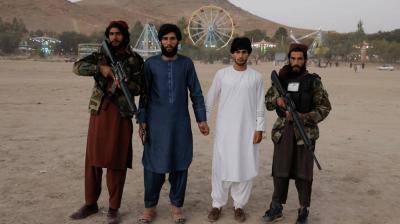Recently, the difficulties faced by the United States in containing rising threats in Afghanistan have increased. According to sources from Al Arabiya and Al Hadath, the primary concern for Americans now revolves around the Taliban's intentions and the failure of the U.S. government to secure assistance from neighboring countries.
**Tons of Weapons**
Sources from "Al Arabiya/Al Hadath" confirmed that the weapons seized by the Taliban are estimated to be in the thousands of tons; however, they do not pose a qualitative or strategic threat to the United States. U.S. Department of Defense sources reiterated a previous statement that Americans had not provided advanced weapons to Afghan forces but instead supplied individual and low-tech arms designed for counterinsurgency, which the Taliban has now seized, thus they do not pose a danger to the U.S. Additionally, a former worker in Afghanistan stated that since 2005, Afghans have needed ongoing American support to maintain and operate their weapons. With the withdrawal of U.S. forces, technical capabilities have diminished, although there is still potential to utilize those weapons despite their inferior quality.
**The Pakistani Role**
Furthermore, "Al Arabiya/Al Hadath" learned that the Americans discussed with the Pakistani government the possibility of the Taliban seeking Islamabad’s help with armaments and repairs, as the Pakistani army possesses good technical capabilities and advanced infrastructure, and the relationship between Pakistan and the Taliban is close. The Americans now believe that it is required of the Taliban to fulfill the promises made, including allowing Americans, foreigners, and Afghans wishing to leave the country to do so. If the Taliban fails to meet these promises, the United States will act more decisively to prevent any Pakistani assistance to the group.
**Aircraft Issues**
The issue of the Afghan Air Force aircraft, which pilots transported to Central Asian countries, also appears complicated for all parties involved, and a solution has not been found between the Americans and the Central Asian countries hosting these aircraft, alongside the Taliban's demands for these planes. The Americans currently state that these aircraft were a gift from the U.S. government to the Afghan Air Force, and with its dissolution, the donor has the right to reclaim what was provided. The U.S. government also believes it has the right to recover those aircraft, transfer them to another country, or destroy them, while this matter remains unresolved with host countries like Tajikistan, Turkmenistan, and Uzbekistan, among other ongoing issues between Washington and Central Asia.
**Friendly Arabs**
It is evident that the United States, particularly Central Command, faces significant challenges in implementing its current policy regarding Afghanistan, especially concerning its neighboring countries. Sources confirm that the U.S. sees its political, security, and military relationships with Gulf Arab countries as the best possible partnership in these difficult times. In recent weeks, American naval presence in the Arabian Sea and the Gulf has decreased, as the aircraft carrier sent by the U.S. has returned to the Pacific. However, alternatives are available at U.S. bases spread across Gulf Arab countries. Sources also indicated that U.S. forces are utilizing these partnerships with the Gulf to implement the "Over-the-Horizon" strategy.
Moreover, American military officials view these bases as a launch point for the aerial surveys required by U.S. forces in Afghan airspace, and these bases are the closest geographically, which provides a considerable degree of comfort regarding the depth of these relationships with their strategic partners there.
**The Danger of Vacuums**
The Americans are not limiting their aerial surveillance to drones and fighter jets in Afghanistan; they assert that they also rely on other means, including satellites and eavesdropping. The difficult question remains regarding the effectiveness of all these measures and tools. The Americans do not currently argue that the threat in Afghanistan has necessarily escalated; however, the "Over-the-Horizon" strategy is more challenging than other strategies, and the absence of allied ground forces exacerbates difficulties and risks. The geographical distance between air bases and Afghanistan complicates military operations.
In closing, a former service member in Afghanistan stated that the mere presence of the Taliban should raise deep concerns, and the greatest danger is the vacuum left in their wake. If a hostile party wishes to fill this vacuum, then an escalation of danger from that direction is likely.




